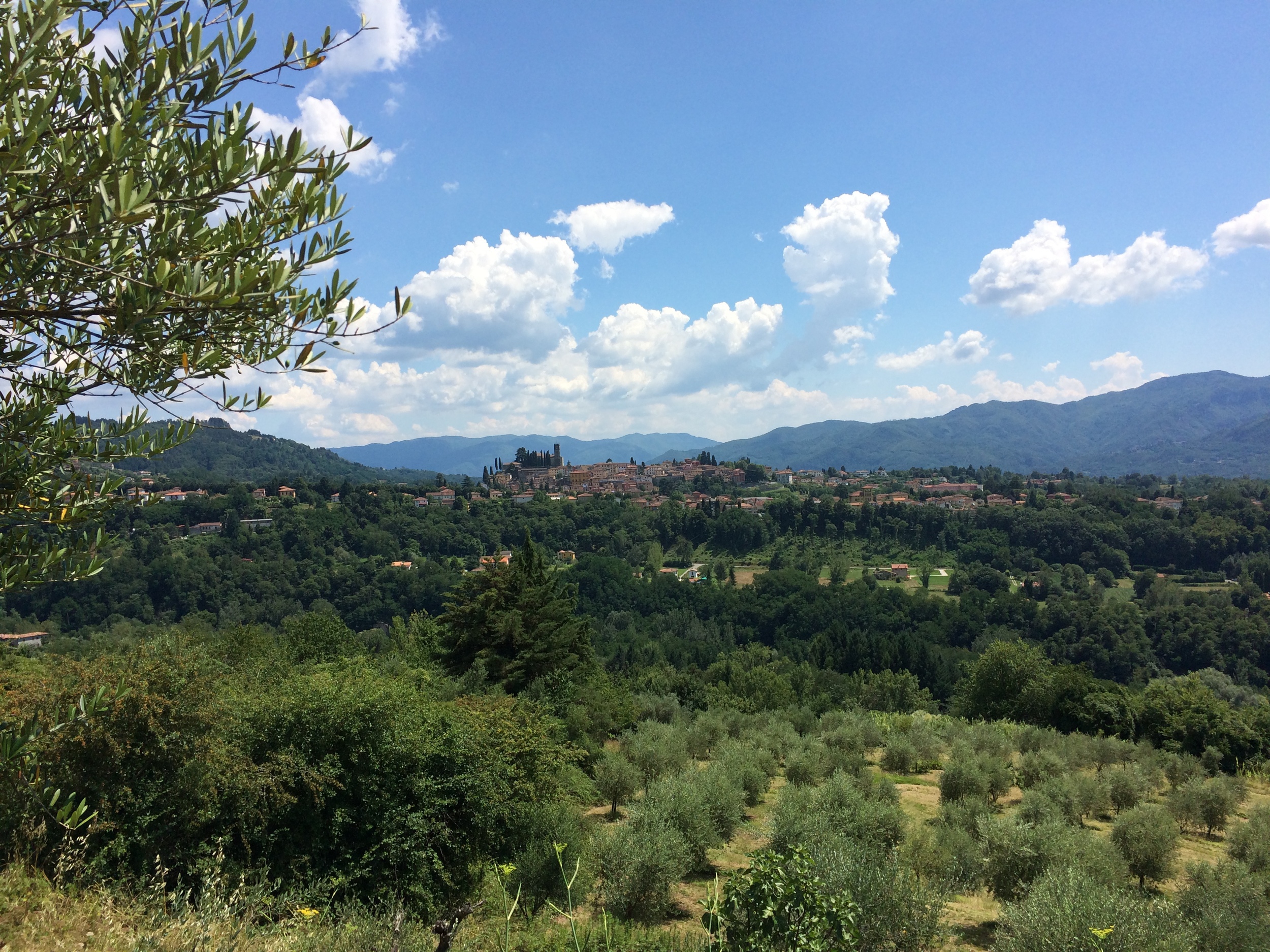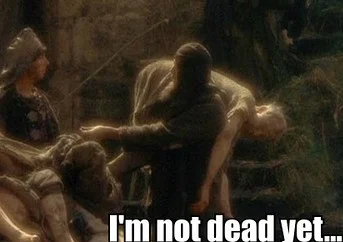I saw this article by Adam Ruben make the rounds on Twitter a few days ago. Then I saw the article spreading on Facebook, with friends from grad school saying things like "So true!" and "That's totally me!" so I took a look.
He had me until the grants ("I dread writing grants…") but then I realized I wasn't even a third of the way through his list. It just went on and on, with an increasing tone of whininess. The post spirals out into a humble brag. By the time I got to the mice he's killed, I just grumbled, "Okay, dude, we get it. Poor you."
If you can sift through it, though, he makes some points about the culture of academic science that are worth expanding on.
I am not a priestess of Science
- I don’t sit at home reading journals on the weekend.
- I have skipped talks at scientific conferences for social purposes.
- Sometimes I see sunshine on the lawn outside the lab window and realize that I’d rather be outside in the sun.
- I have gone home at 5 p.m.
I love being a scientist, but I have a mighty big problem with the idea that as a scientist (or more broadly, as an academic) I'm supposed to "devote my life" to my work. That's not called Science, that's called Workaholism. If that’s what you enjoy, then by all means do it, but don’t expect me to have the same desires.
Here's my own confession: I worked roughly 8:30-5:30 five days a week through grad school. Sometimes I would keep working when I got home, but that didn't happen every week, much less every day. I came in to work or worked at home a few weekends, but I never made it a routine thing.
It's not that I wasn't dedicated to science or my research project. It's not that I didn't care, or that I was lazy. It's that I needed balance. For the most part, I leave work at work, and I am home at home. Balance for me means lunchtime chatter with friends, Friday date nights with my husband, and brunch with the in-laws. It means taking holidays and coming to work focused. We talk and talk about "work–life balance," but the cultural incentives are heavily on the side of more work and not at all balanced.
The summer after my freshman year, I spent about three months as an REU-type student at Duquesne University. It was awesome, and I learned so very much. An important part of what I learned, though, was that I needed to Stop. I lived in a dorm, worked in the lab, and knew almost no one besides the people I worked with. I ate breakfast in the dorm room, lunch in the lab break room, and dinner back in the dorm room. I had a crappy-to-okay Internet connection, I didn't know my way around Pittsburgh (and was honestly a little frightened of wandering the city alone), and I was too shy to get to know the other girls on my floor, so I stayed in and read research papers. I read a lot of articles that summer. I still have them all, in a cardboard box tucked at the back of a closet. I didn't understand half of what they said on the first read-through, so I read them over and over, looked up terms online, asked questions in the lab, and just tried to work it all out through context. At the end of the summer, I was praised for my efforts, but I was also teetering towards burn-out. I hadn’t spent enough time away from science.
I have been very careful since then to take breaks and disconnect from work. I have sought balance. And I have advised newer students to be mindful of their own balance. I love my science very much, but I refuse to pass on the idea that the only way to succeed in science is as part of a monastic order.
I am not a priestess of Science. I got a PhD all the same.
A PhD is not proof of knowing everything
- I remember about 1% of the organic chemistry I learned in college. Multivariable calculus? Even less.
- I have felt certain that the 22-year-old intern knows more about certain subjects than I do.
- I have pretended to know what I’m talking about.
- I find science difficult.
- I have worked as a teaching assistant for classes in which I did not understand the material.
- I have taught facts and techniques to students that I only myself learned the day before.
- I have feigned familiarity with scientific publications I haven’t read. 1
A PhD is not proof of knowing anything. It's rewarded for "Persistence to a high Degree" as much as anything. It's not about facts you've memorized, or stuff you can recall on demand–no matter what certain committee members may say. It's about learning something new. And that new stuff wasn't in the classes you took. (As I've discussed with some friends and labmates before: course material covers stuff someone already knows; research is stuff we don't know yet.)
The work you do in a PhD is, as a rule, highly specialized and focused. I spent most of 5 years watching one protein in one pathway in one kind of bacteria. I am the world's expert on the motion of that protein. Yippee. I don't have equal expertise for other bacteria, or even other proteins in the same bacteria, much less other aspects of microbiology, microscopy and the rest. But I do have some expertise, and I have much more in these particular fields than a friend who has studied the thermodynamics of two dimensional structures, or another friend who has studied the surface chemistry of semiconductors. The three of us have each spent 5 years studying chemistry, and we have each earned a PhD for doing so, but we would not be able to pick up each other's projects on a whim. It would take more time and more learning. The need to learn something new doesn't make us bad scientists.
We have got to get over the idea that we must know everything, that everyone around us knows everything and expects the same of us. It's just not true, and it sets unrealistic expectations.
Academics posture too much
- I have asked questions at seminars not because I wanted to know the answers but because I wanted to demonstrate that I was paying attention.
- I have worried more about accolades than about content.
I don't understand why seminars start with the speaker's professional biography. It's not like it'll convince me to come see the talk: I'm already there, sitting in a seat. And if you were to tell me the speaker is from Nowhere State and has done absolutely nothing of note, I'm still not about to get up and leave. Will the talk be better because I now know that Dr. I-Never-Heard-Of worked with Dr. Famous? Fame, publication record and grant money are no guarantees for talk quality, yet those are the things chosen for introductions.2
With fame so highly valued, I suppose it's no surprise that people (in my experience, mostly men) feel the need to show off. Asking a question brings you to the attention of the seminar speaker and the audience. If you don't care about the answer, please don't ask the question; you're just wasting everyone else's time with your ego-stroking. Let someone else ask the question they care about. This counts double for "questions" that don't ask anything. Those are called statements. Keep them to yourself during the open Q&A.
Most scientists don't communicate well
- I can’t read most scientific papers unless I devote my full attention, usually with a browser window open to look up terms on Wikipedia.
- When a visiting scientist gives a colloquium, more often than not I don’t understand what he or she is saying. This even happens sometimes with research I really should be familiar with.
- When I ask scientists to tell me about their research, I nod and tell them it’s interesting even if I don’t understand it at all.
- I have used big science words to sound important to colleagues.
I like words. I like big, fancy words and unusual words and old words hardly anyone uses, but if you study too long for words of four syllables,3 I lose patience. Tell me how you rowed the boat gently down the stream, but not how you 'propelled the craft placidly through the liquid solution.’4 I'll know you're smart by the clarity of your point, not the frills in your sentences or the jargon you use. You don't have to emulate Newton and hide your knowledge in nonsense sentences.
Scientists are people
- Sometimes science feels like it’s made of the same politics, pettiness, and ridiculousness that underlie any other job.
Sorry to break it to you, fella, but science is like any other job. There are politics and pettiness, rudeness and ridiculousness. There are easily bruised egos. There are liars and cheats. There are people doing this job, flaws, fears and all. We scientists aren't a special case.
This is what a scientist looks like
As a counter to Ruben's concept of a scientist, here is my own list:
- Science is my job, not my life.
- I do not know everything.
- I do not need to know everything.
- I do not learn by pretending to know.
- My knowledge is not spoiled by sharing it with others.
- I am not perfect.
- I am a scientist anyway.
1: Another article I read this week was on feigning cultural literacy. It's worth a read. There's a lot of overlap here.
2: Possibly the worst scientific talk I have ever sat through was given by a Nobel laureate; it was absolutely dreadful.
3: “…he does not write with ease. He studies too much for words of four syllables. Do not you, Darcy?” – Mr. Bingley, Pride & Prejudice
4: In case you're not familiar with the “sophisticated version" of "Row Your Boat"
Propel, propel, propel your craft
Placidly down the liquid solution.
Ecstatically, ecstatically, ecstatically, ecstatically,
Existence is but an illusion.


